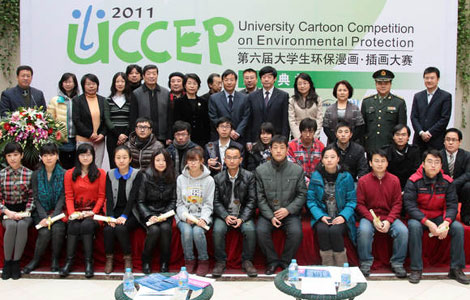Chinese tourists flocking to neighbor
Updated: 2012-01-09 07:37
By Cang Wei (China Daily)
|
|||||||||||
BEIJING - Lu Na thinks that the 4,000 yuan ($630) she spent on traveling to the Republic of Korea (ROK) was worth every penny.
"Apart from the exotic outfits and tasty kimchi, I really appreciated local people's friendliness and the convenient language environment there," said the 27-year-old, who traveled to the country in October 2011 and came back with bags of fashionable dresses and cosmetics.
"I could communicate freely most of the time in the ROK, because there were Mandarin-speaking attendants at many hotels, shopping malls and tourist attractions," Lu said.
Zhu Linlin, media manager of the Korea Tourism Organization's Beijing branch, said that "there is nothing to worry about" if a Chinese person travels to the ROK.
"We have provided many services to Chinese visitors, including free transport cards, handbooks for individual tourists, and more liberal visa policies."
"We believe that no country can compare with the ROK in providing services for individual Chinese travelers," said Zhu.
According to statistics from China Tourism Academy, the number of Chinese tourists visiting the ROK reached more than 2 million by the end of October 2011, up 19.9 percent compared with the same period last year.
In 1998, China granted the ROK approved destination status, which allowed Chinese citizens to travel to the country in tour groups.
Favorable visa policies contribute greatly to the popularity of the ROK as a destination for Chinese tourists.
According to Zhao Hui, manager of the Korean marketing department with China Comfort Travel Group Co Ltd, only a passport and an ID card are needed for a Chinese citizen to get a visa to the ROK.
"There are so many Chinese visitors that, during tourist season it's very hard to reserve hotel rooms," said Zhao.
Li Chuangxin, a researcher from China Tourism Academy's International Tourism Development Institute, said that since February 2008, Chinese tourists can travel visa free to the ROK's Jeju Island for up to 30 days.
However, Zhao suggests that ROK hotels should provide special dining rooms for Chinese customers due to different eating habits.
"ROK people often cross their legs when they have meals, but for most Chinese people, especially those who are elderly or fat, it's very hard for them to sit cross-legged without feeling numb."
- Nationwide rush for home kicks off
- Regional free trade talks in the pipeline
- WB chief economist optimistic of China economy
- Central bank suspends bill issue ahead of holiday
- Clouds on economic horizon: ex-trade official
- Buffett to welcome Chinese New Year in song
- Tea firms set to explore high-end int'l market
- Inspectors had hands full in 2011









